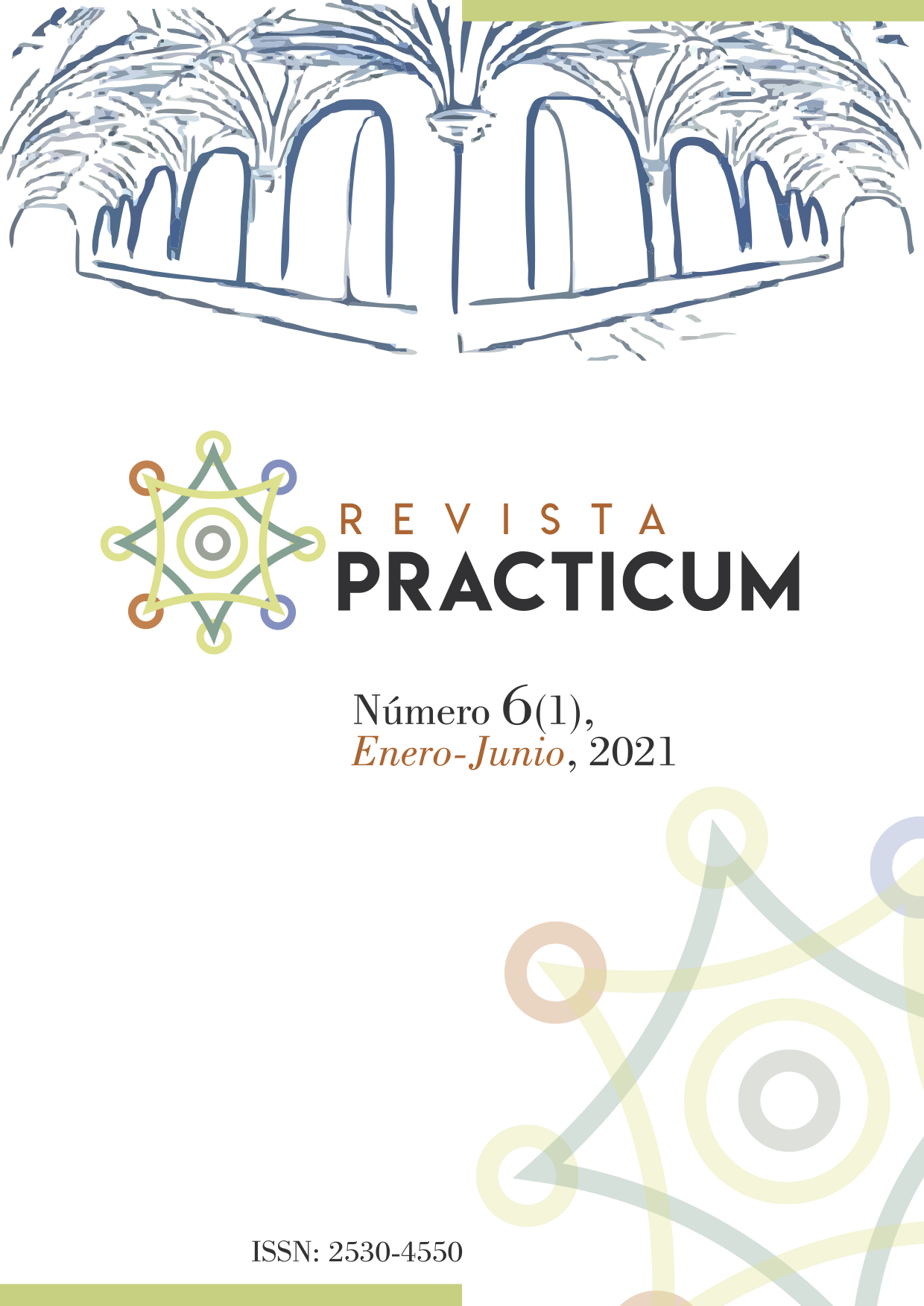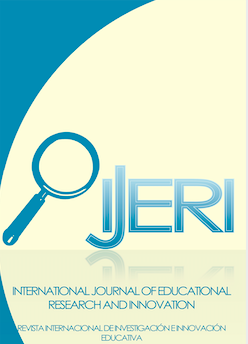Checking the effectiveness of materials for reflection on professional teaching skills. An action research study
DOI:
https://doi.org/10.24310/RevPracticumrep.v6i1.10230Keywords:
Formación de profesores; competencias docentes; Practicum; Investigación-acción, resistencia al cambio.×Abstract
Training professional / competent teachers is the challenge to be overcome by any teacher training program, but the Spanish faculties of education do not direct express attention to saving this problem. The action research project we present shows the effectiveness of a material on professional teaching competences and the degree to which it manages to train more competent / expert teachers, although it also shows great resistance in its use. The discussion of the results, although with the limitations of action research studies, offers a favorable reflection for the improvement of the current teacher training programs of our schools of education.
Downloads
Metrics
References
Arias, R., Cantón, I. y Baelo, R. (2017). El Prácticum de las universidades españolas. RIFOP, 88, 109-132
Baker, T., Evers, G. y Brock, R. (2017). Targeted teaching. Sage.
Ball, D. y Bass, H. (2001). Interweaving Content and Pedagogy. En J. Boaler (Ed.), Multiple Perspectives on Teaching and Learning, 83-104. Ablex.
Ball, D. y Forzani, F. (2009). The Work of Teaching and the Challenge for Teacher Education. JET, 60 (5), 497-511. https://doi.org/10.1177/0022487109348479
Berliner, D. (2000). A Personal Response to Those Who Bash Teacher Education. JET, 51 (5), 358-371. https://doi.org/10.1177/0022487100051005004
Berliner, D. (2001). Learning About Learning From Expert Teachers. IJER, 35, 463-482. https://doi.org/10.1016/S0883-0355(02)00004-6
Blatchford, R. (2017). The Teachers’ Standards in Classroom. Sage.
Bronkhorts, L., Koster, B., Meijer, P., Woldman, N. y Vermut, J. (2014). Exploring Teachers’ Resistance to Teacher Education Pedagogies. TATE, 40, 73-82. https://doi.org/10.1016/j.tate.2014.02.001
Capel, S., Leask, M. y Younie, S. (2016). Learning to Teach in Secondary School. Routledge.
Calderhead, J. (1989). Reflective Teaching and Teacher Education. Teaching and Teacher Education, 5 (1), 43-51. http://dx.doi.org/10.1016/0742-051X(89)90018-8
Carr, W. y Kemmis, S. (1986). Becoming critical. Falmer Press.
Chi, M., Glaser, R. y Farr, M. (Eds.). (1988). The Nature of Expertise. LEA.
Chi, M. y Koeske, R. (1983). Network Representation of a Child’s Dinosaur Knowledge. Developmental Psychology, 19, 29-39. http://dx.doi.org/10.1037/0012-1649.19.1.29
Cochran-Smith, M. (2005). Teacher Educators as Researcher. TATE, 21 (2), 218-225. https://doi.org/10.1016/j.tate.2004.12.003
Conferencia de Decanos de las Facultades de Educación. (2017). Modelo de acceso a la profesión docente. Santiago-Universidad.
Darling-Hammond, L. (2006a). Powerful teacher education. JosseyBass.
Darling-Hammond, L. (2006b). Constructing 21st-century teacher education. Journal of Teacher Education, 57 (3), 300-314. https://doi.org/10.1177/0022487105285962
Darling-Hammond, L. y Rothman, R. (2015). Teaching in the flat world. Teachers-College-Press.
Day, C. (2017). Teachers’ Worlds and Works. Routledge.
Duffy, G. y Roehler, L. (1986). Constraints on Teacher Change. JET, January-February, 55-58. https://doi.org/10.1177/002248718603700112
Facultad de Educación Universidad de Granada (2019). Guía para el Prácticum. Grado Educación Primaria.
Forzani, F. (2014). Understanding “Core Practices”. “Practice-Based”. JET, 65 (4), 357-368. https://doi.org/10.1177/0022487114533800
Garret, J. y Segall, A. (2013). (Re)considerations of Ignorance and Resistance. JTE, 64 (4), 284-304. https://doi.org/10.1177/0022487113487752
Glaser, R. y Chi, M. T. (1988). Overview, in M.T.H. Chi, R. Glaser y M.J. Farr (Eds.), The nature of expertise. Erlbaum.
Gobbo, C. y Chi, M. (1986). How Knowledge is Structured and Used by Expert and Novice Children. Cognitive-Development, 1, 221-237.
González-Sanmamed, M. (2015). El Prácticum en la Formación del Profesorado. Revista Española de Pedagogía, mayo-agosto, 301-319.
Gravells, A. (2017). Principles and Practices of Teaching. SAGE.
Hargreaves, A. y Fullan, M. (2012). Professional Capital. Teachers College-Press.
Kaufer, S. y Chemero, A. (2015). Phenomelogy: An introduction. Polity Press.
King, N., Horrocks, C. y Brooks, J. (2019). Interviews in qualitative research. Sage.
Leinhartdt, G. y Greeno, J. (1986). The Cognitive Skill of Teaching. JEP, 8 (2), 75-95. http://dx.doi.org/10.1037/0022-0663.78.2.75
Lortie, D. (1975). Schoolteacher: A Sociological Study. Chicago Press.
Loughran, J. (2002). Effective Reflective Practice. JET, 53 (1), 33-43. https://doi.org/10.1177/0022487102053001004
Marina, J. A., Pellicer, C. y Manso, J. (2015). Libro Blanco para la profesión docente. Ministerio Educación.
McIntosh, P. (2010). Action Research and Reflective Practice. Routledge.
McNiff, J. (2013). Action research. Principles and practices. Routledge.
Midddleton, M., Abrams, E. y Seaman, J. (2011). Resistence and Disentification. New Directions for Teaching and Learning, 126, 67-75. https://doi.org/10.1002/tl.445
Moral, C. (2018). Guía para el Prácticum. Avicam.
Moral. C. (2019). Competencias para el diseño y desarrollo de experiencias de aprendizaje en la formación del profesorado. Síntesis
Moral, C. (próxima publicación). Coherencia curricular del programa de Prácticum para el Grado de Educación Primaria.
Neuendorf, K. (2017). The content analysis. Sage.
OCDE. (2005). Teachers Matter. OCDE.
Ortiz, C. (2012). The Psychology of Lean Improvements: Routledge.
Pollard, A. (2014). Reflective Teaching in Schools. Bloonsbury.
Sellars, M. (2017). Reflective Practice for Teachers. Sage.
Sinnema, C., Meyer, F. y Aitken, G. (2017). Capturing the Comple. JET, 68 (1), 9-27. https://doi.org/10.1177/0022487116668017
Teddlie, C. y Tashakkori, A. (2013). Mixed Methods Research. In Strategies of Qualitative Inquiry. En N. Denzin y Y. Lincoln (Eds.) 135-168. Sage.
Terhart, E. (2013). Teacher Resistance Against School Reform. SLM, 33 (5), 486-500. https://doi.org/10.1080/13632434.2013.793494
Torres, J. y Perea, V. (2009). Cálculo de la fiabilidad y la concordancia. RIE, 27, (1), 89-103.
Van Manen, M. (1977). Linking Ways of Knowing With Ways of Being Practice. Curriculum Inquiry, 6, 205-208. . http://dx.doi.org/10.2307/1179579
Wang, J., Lin, E., Spalding, E., Odell, S. y Klecka, C. (2011). Quality Teaching and Teacher Education. JTE, 62 (4), 115-120. http://dx.doi.org/10.1177/0022487111409551
Wolff, C., Jaodzka, H. y Boshuizen, H. (2017). See and tell: differences between expert and novice teachers. TATE, 66 , 295-308. https://doi.org/10.1016/j.tate.2017.04.015
Zabalza, M. (2011). El Prácticum en la Formación Universitaria. Revista de Educación, 354, 21-43.
Downloads
Published
How to Cite
Issue
Section
License
Acceptance of the work implies that the author grants Revista Prácticum the exclusive rights to reproduce, distribute and sell his or her work worldwide, both in digital and paper formats, CD-ROM, etc.
Likewise, the authors shall grant Revista Prácticum the rights of dissemination, public communication on the Internet and IT networks, data buses, as well as any other portals or electronic devices for online consultation of its contents and extracts, under the conditions of the portal, repositories or databases where the work is stored.
Revista Prácticum allows authors to publish and disseminate their articles and works on their personal websites, research teams, institutional repositories and scientific databases. All this in accordance with the Creative Commons 4.0 License









8.png)








